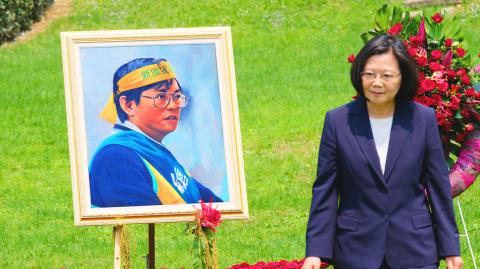President Tsai Ing-wen (蔡英文) yesterday warned of threats to the nation’s democracy and the importance of free speech as she attended a commemoration ceremony in Keelung for democracy advocate Deng Nan-jung (鄭南榕).
Yesterday’s ceremony, part of Freedom of Expression Day celebrations, marked the 30th anniversary of the death of the publisher, also known as Nylon Deng, by self-immolation in his Taipei office after a 71-day standoff with police, who wanted to arrest him on charges of sedition in January 1989 for publishing a draft “Taiwan Republic Constitution” in his magazine, Freedom Era Weekly.
“[China] wants to use our democracy against us. I simply cannot accept this, and I believe Taiwanese in general would not accept this,” she said.

Photo: Lin Hsin-han, Taipei Times
“As president I will persevere in the fight for democracy,” she said.
Free speech is not an abstract or distant concept, Tsai said, adding that her administration had already begun what Deng had sought by repealing the convictions of more than 4,000 victims of political persecution.
These annulments have been therapy for the families of the victims, she said.
The government would continue to dig up and expose injustices committed during the Martial Law era, and would move one step at a time closer toward the nation that Deng had wanted to live in, she added.
“We must allow free speech to be the shared DNA of Taiwanese. This will be the best way to remember Deng Nan-jung these 30 years later,” she said.
“Disinformation” from outside of the nation had become a credible challenge to the values that Taiwanese hold dear, she said.
Reports that China is recruiting Taiwanese Internet celebrities and buying Taiwanese-owned Facebook pages to use for “united front” efforts to erode the nation’s democracy from the inside have caused alarm in Taiwan, Tsai said.
The threat to Taiwan’s democracy is as credible as the terrorism that threatens European countries, she said.
Democracy should not be taken for granted, and it is important for Taiwanese to be brave and stand up in defense of Taiwan’s freedoms when they are under threat, the president said.
The current generation have not experienced life in Taiwan before democratic elections, but they have fought for democracy during the Wild Strawberries movement and the Sunflower movement, she said.
Ensuring freedom of speech and transitional justice are shared responsibilities of all Taiwanese regardless of generation, gender or affiliation, she said.
The Wild Strawberries movement was a student sit-in that began in front of the Executive Yuan on Nov. 7, 2008, to protest against a ban on the national flag and the playing of Taiwanese songs during a visit by a Chinese delegation led by then-Association for Relations Across the Taiwan Straits (ARATS) chairman Chen Yunlin (陳雲林) to Taipei.
The Sunflower movement was the 2014 occupation of the Legislative Yuan by students and others against the then-Chinese Nationalist Party (KMT) government’s efforts to push through legislative approval of the Cross-Strait Service Trade Agreement that had been signed on June 21, 2013, by the Straits Exchange Foundation and ARATS in Shanghai.
Additional reporting by staff writer

CHAOS: Iranians took to the streets playing celebratory music after reports of Khamenei’s death on Saturday, while mourners also gathered in Tehran yesterday Iranian Supreme Leader Ayatollah Ali Khamenei was killed in a major attack on Iran launched by Israel and the US, throwing the future of the Islamic republic into doubt and raising the risk of regional instability. Iranian state television and the state-run IRNA news agency announced the 86-year-old’s death early yesterday. US President Donald Trump said it gave Iranians their “greatest chance” to “take back” their country. The announcements came after a joint US and Israeli aerial bombardment that targeted Iranian military and governmental sites. Trump said the “heavy and pinpoint bombing” would continue through the week or as long

TRUST: The KMT said it respected the US’ timing and considerations, and hoped it would continue to honor its commitments to helping Taiwan bolster its defenses and deterrence US President Donald Trump is delaying a multibillion-dollar arms sale to Taiwan to ensure his visit to Beijing is successful, a New York Times report said. The weapons sales package has stalled in the US Department of State, the report said, citing US officials it did not identify. The White House has told agencies not to push forward ahead of Trump’s meeting with Chinese President Xi Jinping (習近平), it said. The two last month held a phone call to discuss trade and geopolitical flashpoints ahead of the summit. Xi raised the Taiwan issue and urged the US to handle arms sales to

State-run CPC Corp, Taiwan (CPC, 台灣中油) yesterday said that it had confirmed on Saturday night with its liquefied natural gas (LNG) and crude oil suppliers that shipments are proceeding as scheduled and that domestic supplies remain unaffected. The CPC yesterday announced the gasoline and diesel prices will rise by NT$0.2 and NT$0.4 per liter, respectively, starting Monday, citing Middle East tensions and blizzards in the eastern United States. CPC also iterated it has been reducing the proportion of crude oil imports from the Middle East and diversifying its supply sources in the past few years in response to geopolitical risks, expanding

An Emirates flight from Dubai arrived at Taiwan Taoyuan International Airport yesterday afternoon, the first service of the airline since the US and Israel launched strikes against Iran on Saturday. Flight EK366 took off from the United Arab Emirates (UAE) at 3:51am yesterday and landed at 4:02pm before taxiing to the airport’s D6 gate at Terminal 2 at 4:08pm, data from the airport and FlightAware, a global flight tracking site, showed. Of the 501 passengers on the flight, 275 were Taiwanese, including 96 group tour travelers, the data showed. Tourism Administration Deputy Director-General Huang He-ting (黃荷婷) greeted Taiwanese passengers at the airport and